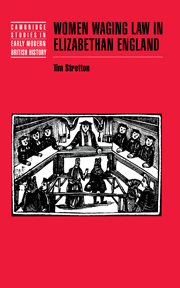Book contents
- Frontmatter
- Contents
- Lists of maps and figures
- List of tables
- Preface
- Notes on the text
- Abbreviations
- 1 Introduction
- 2 Women, legal rights and law courts
- 3 Female litigants and the culture of litigation
- 4 The Court of Requests
- 5 Unmarried women and widows
- 6 Married women in Requests
- 7 Freebench, custom and equity
- 8 Pleading strategies in Requests
- 9 Women waging law
- Glossary
- Bibliography
- Index
- Cambridge Studies in Early Modern British History
2 - Women, legal rights and law courts
Published online by Cambridge University Press: 11 November 2009
- Frontmatter
- Contents
- Lists of maps and figures
- List of tables
- Preface
- Notes on the text
- Abbreviations
- 1 Introduction
- 2 Women, legal rights and law courts
- 3 Female litigants and the culture of litigation
- 4 The Court of Requests
- 5 Unmarried women and widows
- 6 Married women in Requests
- 7 Freebench, custom and equity
- 8 Pleading strategies in Requests
- 9 Women waging law
- Glossary
- Bibliography
- Index
- Cambridge Studies in Early Modern British History
Summary
All offyces belongynge to the common weak be forbydden [women] by the lawes. … It is not permitted to a woman, though she be very wise and prudent, to pleade a cause before a Juge, furthermore they be repelled in jurisdiction, in arbiterment, in adoption, in intercession, in procuration, or to be gardeyns or tutours in causes testamentary and criminall.
Henricus Cornelius Agrippa, Of the Nobilitie and Excellencie of Womankynde (London, 1542)The past hundred years have witnessed a see-sawing of historians' perceptions of the legal status of women in early modern England. To Frederick Pollock and F.W. Maitland, writing in the final decades of the nineteenth century, the position was clear. By the time of Edward I, ‘a sure instinct has already guided the law to a general rule which will endure until our own time. As regards private rights women are on the same level as men, though postponed in the canons of inheritance; but public functions they have none.’ Charlotte Carmichael Stopes, Alice Clark and other historians in the vanguard of feminist history in the late nineteenth and early twentieth centuries agreed that women enjoyed a degree of legal independence in England prior to the seventeenth century, under customary law at least. However, far from ‘enduring until their own time’, they suggested that the combined influences of capitalism, industrialisation, the emergence of the professions and the rise to supremacy of the common law steadily undermined any independence women had once enjoyed.
- Type
- Chapter
- Information
- Women Waging Law in Elizabethan England , pp. 21 - 42Publisher: Cambridge University PressPrint publication year: 1998

